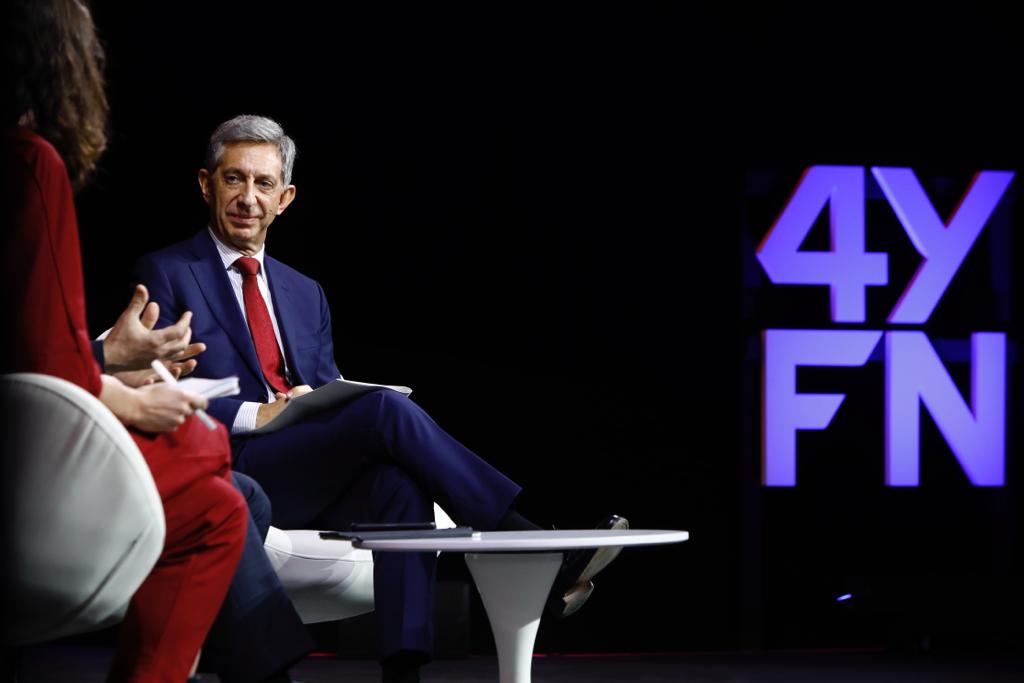
- Head of Unit at the European Innovation Council (EIC), Viorel Peca, and the CEO of Mobile World Capital Barcelona, Francesc Fajula, discuss the challenges and opportunities of technology transfer at 4YFN.
- Fostering the entrepreneurial mindset of researchers, harmonising regulations, or attracting investment in Deep Tech are some of the challenges that European countries must address to improve their ability to “translate their scientific and technological innovations into the market.”
- EIC and MWCapital seek to identify and help convert more than a hundred technological projects into spin-offs each year.

February 27, 2024
Head of Unit at the European Innovation Council (EIC), Viorel Peca, and the CEO of Mobile World Capital Barcelona, Francesc Fajula, took center stage today at the Banco Sabadell Stage of 4YFN to discuss how to boost technological transfer in Europe. Fostering the entrepreneurial mindset of researchers, harmonising regulations, or attracting investment in Deep Tech were some of the challenges highlighted during the session that European countries must address to improve their ability to “translate their scientific and technological innovations into the market.”
“The EIC proudly supports European technological development right from its earliest forms at universities and research centres, with funding programmes such us as the EIC Pathfinder and Transition. Still, we see that this knowledge has a lot of business potential that isn’t reaching the market, so we are focused on promoting support programmes such as the EIC Tech to Market”. This is expressed by Viorel Peca, Head of Unit at EIC, which is currently the largest investor in deep tech in Europe, through the EIC Fund.
Peca shared the stage with Francesc Fajula, CEO of MWCapital, which has established itself as the leading scientific-technological venture builder in Europe: “MWCapital is a bridge to narrow the gap between science and the market,” he emphasised. He also stated that “Barcelona has become in recent years a hub for technological investment. Its rich digital ecosystem is a conducive environment for innovation, entrepreneurship, and spin-off generation.”
In 2023, MWCapital became a strategic partner of the EIC, which leads and implements the Tech to Market programme, promoted by the European Commission, allowing the identification, development, and expansion of cutting-edge technologies. Thanks to this partnership, which also involves EurA AG, approximately 80 technological projects are selected each year from cutting-edge research centres and universities throughout Europe, to help them grow into spinoffs that bring these technologies to market. Many of these startups are present in this edition of 4YFN.
Overcoming the gap between science and the market
EIC and MWCapital share their vocation as facilitators and accelerators of technological transfer, supporting innovative projects in their transition from the laboratory to the market. As Fajula indicates, Europe excels in scientific production (43% of the world’s most cited articles are authored by Europeans) and has 6 of the top Computing universities and 5 of the top Engineering universities, according to the Times Higher Education index. However, the number of patents and spin-offs generated by the continent does not match these results.
As experts in accompanying innovative projects in their transition from the laboratory to the market, representatives of EIC and MWCapital have shared their vision about the “barriers” that are present in tech transfer that Europe faces and the necessary changes to overcome this gap.
Firstly, fostering the entrepreneurial mindset of researchers. “Europe has made progress in collaboration between the academic world and industry, but many researchers still prioritise publishing articles over commercialising innovations. To facilitate this transition, intermediaries are needed to connect the university with companies and investors, accompany researchers, and act as business accelerators. An effort in which organisations like MWCapital can play a fundamental role,” defended Francesc Fajula.
Another challenge is investment in innovation. Although this has increased in recent years, it is still difficult to attract funding in the early stages, particularly in the Deep Tech sector. To attract more investment, the European Commission representative advocates combining strategies such as “promoting public-private partnerships,” “leveraging the European Investment Fund,” or “offering incentives to generalist funds,” as well as “making the participation of universities in their startups more flexible,” opening them up to external investment.
Barcelona, the role model for attracting technological investment
The CEO of Mobile World Capital Barcelona highlighted another decisive factor that will influence Europe’s strategic role in the coming years and will position Barcelona as the leading capital in Deep Tech: “Europe must bet on those high-value technologies in which it can be differential, such as generative AI, biotechnology, renewable energies, advanced manufacturing, clean technologies, quantum, or semiconductors.” Indeed, Fajula also pointed out that “the Catalan capital has become in recent years a hub for technological investment. The distinctive features of the city and its ecosystem are an undeniable international attraction.”
Stay up to date about everything
Subscribe to stay up to date with the latest content from Mobile World Capital Barcelona.